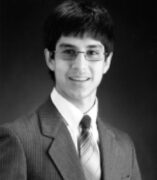
Ismael Biyashev
Resident Graduate Scholar
Department of History
About
Beyond Myths and Ruins: Archaeology and Nomadism in Russia (1850-1925)
Tentatively titled Beyond Myths and Ruins: Archaeology and Nomadism in Russia (1850-1925), my project is the first attempt to write a history of the archaeology of nomadism in the Russian empire and the early Soviet Union and chart its historical development. My dissertation is framed by, and seeks to explain, the paradoxical rise of “nomadic archaeology” in the Russian Empire in the mid 19th century, which emerged from the ostensible incompatibility of the two phenomena: nomadism and archaeology. Turn-of-the-century science understood nomads and nomadic cultures as “primitive”, “transient”, and implicitly incapable of historicity. Meanwhile, archaeology as a science aimed precisely to prove historical rootedness and historicity of a given group through “objective” material evidence. In the case of the Russian Empire there was an added element of complexity, as nomads– the “atavistic survivals” of bygone eras, were also a part of the diverse mix of imperial subjects with competing agendas and visions of the future in a rapidly modernizing polity.
The project argues that the diversity of scholarly interpretations of nomadic archaeology in the Russian Empire and early USSR reflects the complex relationships and tensions between archeology and imperial societies undergoing liberalization and nationalization from above and responding to the rising subaltern nationalisms from below. It shows how, for a sundry network of actors of varying cultural, socioeconomic, and political backgrounds, archaeology became a language of modernity, used to make participatory, or sometimes, overtly anti-imperial claims in the changing political climate of the fin de siècle.
The dissertation places these debates in a global context, examining how the vision of archaeology within the Russian Empire and early Soviet Union was influenced by the intra-imperial comparative optics of my dissertation’s various protagonists. Ultimately, the project aims asks questions not just about archaeology, or about the case of the Russian Empire and Soviet Union, but interrogates the politics of knowledge in nationalizing empires. The conclusions that my dissertation arrives at are therefore applicable not just to the Russian imperial case, but empires generally, as crucibles of modern knowledge production.